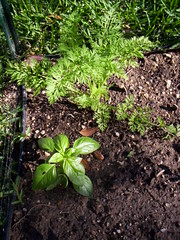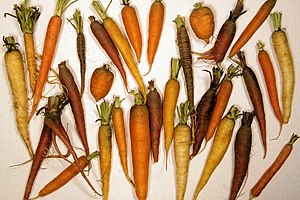If you live in a warm climate, try them at the coolest time of your year, provided of course that the temperature does not dip below freezing, and water them well in dry weather.
| A carrot and a basil plant in the garden. (Photo credit: Spyderella) |
The leaves are edible and very nutritious but they contain a lot of potassium which makes them bitter, so they are best mixed with other vegetables in salads or soups. However, they can produce an allergic skin reaction in some people.
If you decide to grow wild carrots in your organic garden, you should know that the leaves of that plant are toxic. However, regular organic carrot leaves should be fine in small quantities as long as you are not allergic. Interestingly enough, carrots were originally cultivated for their leaves, not their roots.
Provided you have the right conditions, growing carrots is pretty simple. You will find that you can buy many different varieties. They are not all long and thin, and they are not all orange. Heirloom varieties may be purple, for example. Remember to look for organic seeds if you want organic carrots to grow from them.
Stubby or round carrots are an interesting alternative, and can be great for growing carrots in containers where you do not have the depth that long carrots would need. Carrots also do well in raised beds.
Carrots will mature in about 2 months from planting the seeds, but this varies according to the variety, so go by what you see on your seed packet. In temperate climates, plant in the spring. You can start before the last frosts provided that the ground is soft and loose enough to be worked.
| Different varieties of carrots. (Photo credit: Wikipedia) |
You will need to thin your plants when they are a couple of inches tall. Thin them so that all of your growing carrots are at least a half inch apart. One inch is better.
Do not harvest them early, thinking that you will get sweet-tasting baby carrots that way. Most "baby carrot" you see at the supermarket are actually fragments of full-size carrots peeled down, although you can plant varieties that are smaller and ready to harvest sooner if desired. If you harvest regular carrots early, they can be bitter.
Be sure to rotate your carrots around the garden, as you do with other plants. This will prevent pests such as carrot rust from becoming established.
If you follow all of these tips, you should have no trouble growing carrots in your organic garden.



No comments:
Post a Comment